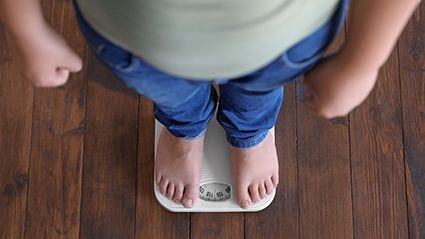FRIDAY, April 9, 2021 (HealthDay News) — Obese women can be more likely to have heavy monthly periods, and now new research hints at why.
In addition to stirring up inflammation, excess weight may slow down the uterine repair process, U.K. researchers reported. Menstruation occurs when the lining of the uterus (endometrium) sheds each month, but the healing process stops the bleeding so the lining can build back up.
Heavy periods — defined as needing to change your tampon or pad after less than two hours and/or passing large blood clots — can take a dramatic toll on a woman’s quality of life, said study author Dr. Jacqueline Maybin, a researcher at the MRC Centre for Reproductive Health at the University of Edinburgh.
“Some people have such heavy periods that they can’t leave the house when menstruating as they flood through their menstrual products onto their clothes,” she said. “This results in work or school absence, an increased financial burden due to paying for extra menstrual products and an inability to carry out caring roles.”
When Maybin and her colleagues measured the body mass index (BMI) and menstrual blood loss of 121 women with regular menstrual cycles, they found that as BMI increased, so did menstrual blood loss. (BMI is a measure of weight in relation to height.) The relationship was weak, but still statistically significant after controlling for other factors that may affect blood loss during menstruation, she said.
The team conducted a companion study in mice to get a better handle on why higher BMIs might cause heavier periods. Mice fed a high-fat diet had significantly greater body weight than those on a normal diet. After shedding their uterine lining, the mice on a high-fat diet showed delayed repair of the remaining lining and greater levels of inflammatory markers than mice on a normal diet did.
More research is needed to confirm the findings, but weight loss and anti-inflammatory medications may lighten monthly periods in obese women.
“A common-sense approach would be to offer weight-loss support to women experiencing heavy menstrual bleeding with a high BMI as part of their treatment,” Maybin said.
There are other causes of heavy menstrual bleeding, including bleeding disorders, fibroids or other abnormal growths in the uterus, she noted.
“It is important to emphasize that [weight loss] should not replace investigations and treatment of [other] underlying causes for their heavy periods,” Maybin added.
The study was published April 9 in the Journal of Endocrinology.
Dr. Andrea Dunaif is a professor of medicine at the Icahn School of Medicine at Mount Sinai and chief of the Division of Endocrinology, Diabetes and Bone Disease at the Mount Sinai Health System in New York City. The new findings mirror what she sees in her practice.
Heavy and irregular periods are more common in women with higher BMIs, said Dunaif.
Losing weight may make a difference for these women, but this is often easier said than done, she noted. Given how hard it is to lose weight and keep it off, doctors often treat the symptoms of heavy menstrual periods after ruling out other potential causes.
“Oral contraceptives containing the hormones estrogen and progestin can keep the uterine lining thinner, resulting in less bleeding,” Dunaif said.
Other U.S. experts cautioned that one can’t immediately assume obesity is the cause of heavy periods.
“Further workup is often needed to see if there is underlying pathology such as a polyp, fibroid or uterine cancer,” said Dr. Nishath Ali, an assistant professor of obstetrics and gynecology at Baylor College of Medicine in Houston.
Dr. Michael Jensen, an endocrinologist at the Mayo Clinic in Rochester, Minn., was skeptical about the new findings.
“Women, as they get heavier, are more prone to heavy periods, but the mouse model is hard to link back to women,” Jensen noted. Weight loss may help reduce blood loss during menstruation, but more research is needed to fully understand why and how obesity affects menstruation in overweight or obese women, he said.
More information
Learn more about the potential causes of heavy menstrual bleeding at the American College of Obstetricians and Gynecologists.
SOURCES: Jacqueline Maybin, MBChB, BSc, PhD candidate and researcher, MRC Centre for Reproductive Health, University of Edinburgh, Scotland; Andrea Dunaif, MD, professor, medicine, department of medicine, Icahn School of Medicine, Mount Sinai, and chief, Hilda and J. Lester Gabrilove Division of Endocrinology, Diabetes and Bone Disease, Mount Sinai Health System, New York City; Nishath Ali, MD, assistant professor, obstetrics and gynecology, Baylor College of Medicine, Houston; Michael Jensen, MD, endocrinologist, Mayo Clinic, Rochester, Minn.; Journal of Endocrinology, April 9, 2021
Copyright © 2026 HealthDay. All rights reserved.

